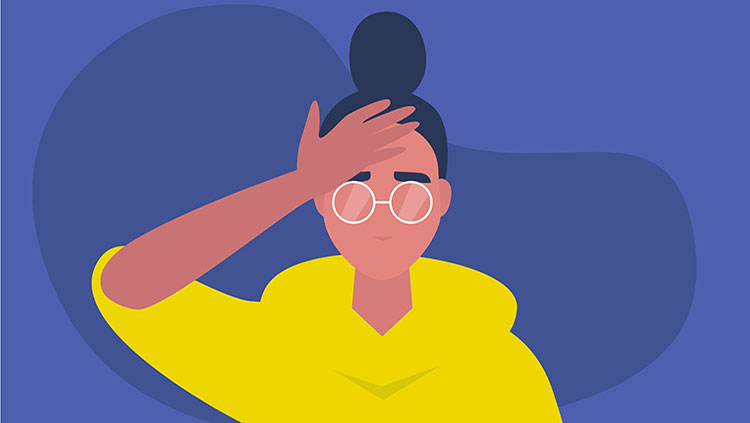How Do Tight Muscles Trigger Headaches?
- Published25 Feb 2021
- Author Rina Diane Caballar
- Source BrainFacts/SfN

It’s early in the morning. You’re jolted awake by the alarm. After a few minutes battling the snooze button, you get out of bed, stretch, and turn your head side to side. Suddenly there’s a tightness — a classic stiff neck. Most of the time, you can ignore the tightness as it usually loosens over the course of the day. But sometimes the tightness lingers and causes a headache.
What goes on in our body that makes muscles tight, and how does this tightness lead to headaches? Egilius L.H. Spierings, director of the Boston Headache Institute and founder of MedVadis Research, a clinical trial research center focused on headache and chronic pain, discusses the relationship between tight muscles and headaches and shares his recommendations for treatment.
What happens in the body that makes muscles tight?
Muscles contract and relax as the brain sends electrochemical signals along the nervous system to the motor neuron, transmitting these signals to muscle fibers and initiating muscle contraction. Once the signals stop, the muscles relax.
Adenosine triphosphate (ATP), a molecule that stores and transports energy to cells, is the energy source for muscle contraction. When muscles contract, they get tight, cutting off blood circulation and producing ATP through a series of chemical reactions, including the breakdown of glycogen into glucose. These chemical reactions result in waste products such as lactic acid, water, and carbon dioxide. When muscles relax, blood circulation resumes, which then flushes out the accumulated waste products.
How do tight muscles contribute to headaches, and what types of headaches are associated with them?
When we talk about muscle tightness in relation to headaches, we’re talking about sustained tightness of muscles: a persistent or prolonged state of contraction that causes pain. When a muscle is persistently tight, waste products accumulate but cannot be flushed out. This accumulation of waste products in the muscle irritates nerve fibers, which then causes pain.
A headache from muscle tightness would be of low-grade intensity — a mild to moderate pain that most people would rate as a 3 or 4 on a 10-point pain scale. When you have it for an afternoon, a day, or two days at most, it’s called an episodic tension headache. An increased sensitivity to light or sound (but not both) may accompany episodic tension headaches, though it’s an uncommon symptom. When this low-grade headache becomes persistent, lasting for weeks or months, it’s called a chronic tension headache. Mild nausea may occur with this type of tension headache.
What causes this sustained muscle tightness?
Stress can cause muscles to tighten for a long period of time. When you’re under stress, your body tenses up. This usually happens more in the jaw, neck, shoulders, upper back, and lower back. Many of these areas have postural muscles that maintain our erect position, so they tend to be more tight than relaxed.
Stress is a common reason why people have episodic tension headaches. Several factors can cause chronic tension headaches, including fatigue, insomnia, iron deficiency, anemia, and hypothyroidism — all of which relate to energy metabolism.
When you’re fatigued, you feel exhausted because you’ve depleted your metabolic energy — the energy your cells use to function. Muscles need energy to relax, so anything that causes fatigue makes people more prone to muscle tightness.
People who have insomnia don’t get enough sleep to build metabolic energy. And individuals with an iron deficiency lack the iron needed to produce hemoglobin, a protein in red blood cells. People who are anemic lack red blood cells that bring the oxygen needed to make energy. Thyroid function regulates energy metabolism, so people with hypothyroidism (low thyroid function) have a hard time building energy.
Are tight muscles a symptom of headaches, or are they a trigger?
Tight muscles are both a symptom and trigger of headaches: You get a headache from tight muscles, and a headache can give you tight muscles.
In tension headaches, muscle tightness is the source of pain — it’s the pain mechanism. With migraines, which are characterized by the recurrence of severe headaches, muscle tightness is a headache driver. When migraine sufferers go through prolonged bad headaches, they experience muscle tightness in their neck, shoulders, upper back, and jaw muscles — and that becomes a driver of migraine headaches.
Would you recommend treating the tight muscles, the headache, or both?
Rest, relaxation, and over-the-counter pain medication can help with tension headaches. But many people often overlook tight muscles, so I recommend working on them. The best way to help tight muscles is with a heating pad. Heat increases energy metabolism, allowing muscles to relax. It also improves circulation, opening up the blood vessels that not only bring oxygen and nutrients to the muscle, but also flush out the waste products that irritate the nerve fibers and cause pain.
Get a good-sized heating pad that drapes over your neck or shoulders and apply it twice a day for about 15 to 20 minutes. If you have chronically tight muscles, use the heating pad every day.
BrainFacts.org welcomes all your brain-related questions.
Every month, we choose one reader question and get an answer from a top neuroscientist. Always been curious about something?
Please submit your question by filling out this form.








